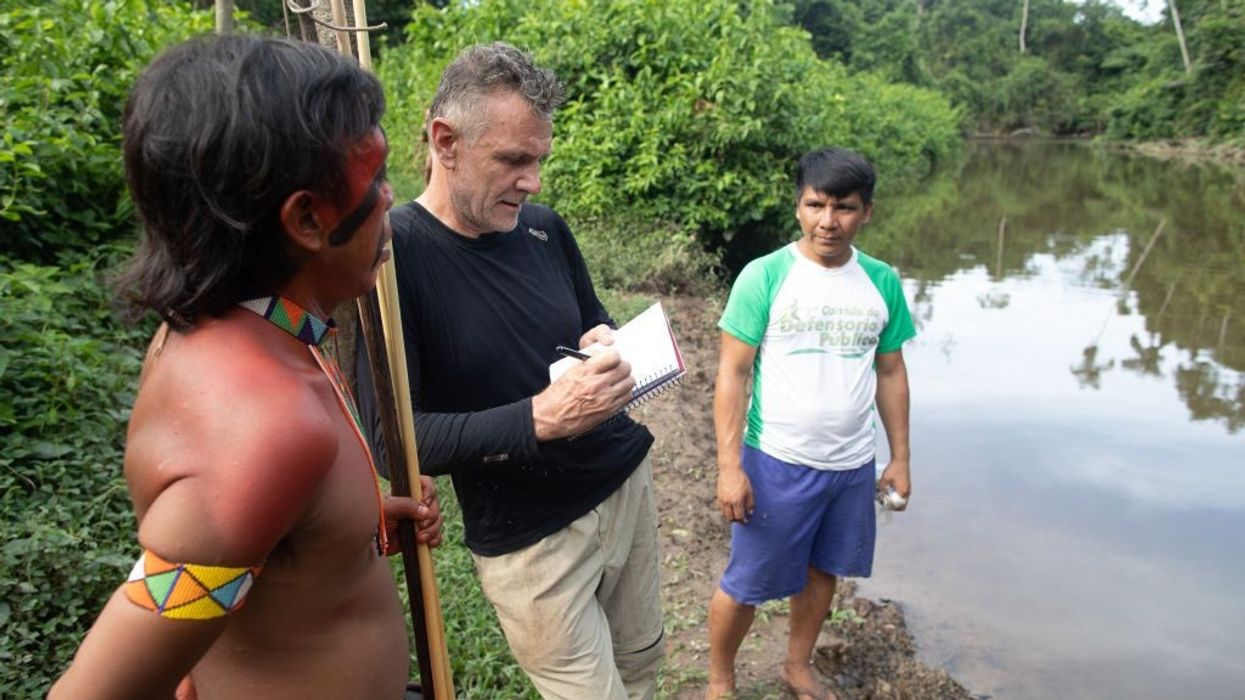RIGHTS groups and families of a British journalist and Brazilian Indigenous expert who went missing deep in the Amazon after receiving threats pleaded for authorities to accelerate the search operation.
Veteran freelance journalist Dom Phillips, 57, and respected Indigenous specialist Bruno Pereira, 41, went missing early Sunday (5) while travelling by boat in Brazil's Javari Valley, near the border with Peru, where Phillips was researching a book.
As the 48-hour mark passed, speculation swirled around whether they could have fallen victims to an accident or foul play.
As of Tuesday (7) night, authorities had no reports on their whereabouts but Amazonas state civil police said they were questioning a "suspect" and that four other people had testified as "witnesses," though no arrests were made.
Local Indigenous activists said the pair received threats last week for their work in the remote region, which has seen a surge of illegal logging, gold mining, poaching and drug trafficking.
Loved ones were holding out hope the pair would be found.
"I want to make an appeal to the government to intensify the search," Phillips's Brazilian wife, Alessandra Sampaio, said in a video message.
"We still have some small hope of finding them. Even if I don't find the love of my life alive, please find them," she said, choking back sobs.
The Brazilian government expressed its "grave concern," and said police were taking "all possible measures to find (the men) as quickly as possible."
But the authorities faced accusations of failing to act urgently enough.
The ministry of defense said in a statement that since Monday the army had deployed 150 soldiers who are "specialists in jungle environment operations, who know the terrain where the searches are being carried out."
But three Indigenous rights groups in the region earlier said in a joint statement that just six state police officers were actively working on the operation, and urged the government to deploy helicopters and a task force.
"The Brazilian government was very slow to act, in a situation where acting quickly is absolutely essential," the World Wildlife Fund (WWF) Brazil office said in a statement.
Brazil's federal police later said they had deployed a second helicopter to aid the effort.
Bolsonaro response criticised
President Jair Bolsonaro drew criticism for appearing to blame the missing men, both of whom have extensive experience in the Amazon rainforest basin.
"Two people in a boat in a region like that, completely wild -- it's an unadvisable adventure. Anything can happen," Bolsonaro said.
"Maybe there was an accident, maybe they were executed."
The far-right president has faced accusations of fueling invasions of Indigenous lands in the Amazon with his pro-mining and pro-agribusiness policies.
Pereira, an expert currently on leave from Brazil's Indigenous affairs agency FUNAI, has spent much of his career fighting such invasions -- making him a target of frequent threats.
'Anguished' wait
The men's families urged the authorities to act fast.
"Time is a key factor in rescue operations, particularly if they are injured," Pereira's family said in a statement.
It said his partner, three children and other relatives were in "anguish."
Phillips's sister Sian posted a video message online, fighting back tears.
"We are really worried about him and urge the authorities in Brazil to do all they can," she said. "Every minute counts."
A group of about 40 reporters and friends of Phillips appealed to Brazilian authorities in a letter published in O Globo newspaper to expand the search effort.
In addition, 11 press organizations requested an emergency meeting with the justice minister and other high-level officials to get a progress report on the hunt.
Phillips, who is based in the city of Salvador, had previously accompanied Pereira in 2018 to the Javari Valley for a story in Britain's Guardian newspaper, where he was a regular contributor.
The 85,000-square-kilometer (33,000-square-mile) reservation is home to around 6,300 Indigenous people from 26 groups, including 19 with virtually no contact with the outside world.
FUNAI's base there, set up to protect Indigenous inhabitants, has come under attack several times in recent years.
In 2019, a FUNAI officer there was shot dead.
The region has seen a surge of illegal mining, logging and poaching in recent years, and its remoteness makes it a haven for drug traffickers, said Fiona Watson, research director at Indigenous rights group Survival International.
"You're talking about dense tropical forest," she said. "The operation to try and locate Bruno and Dom is immensely challenging."
(AFP)





